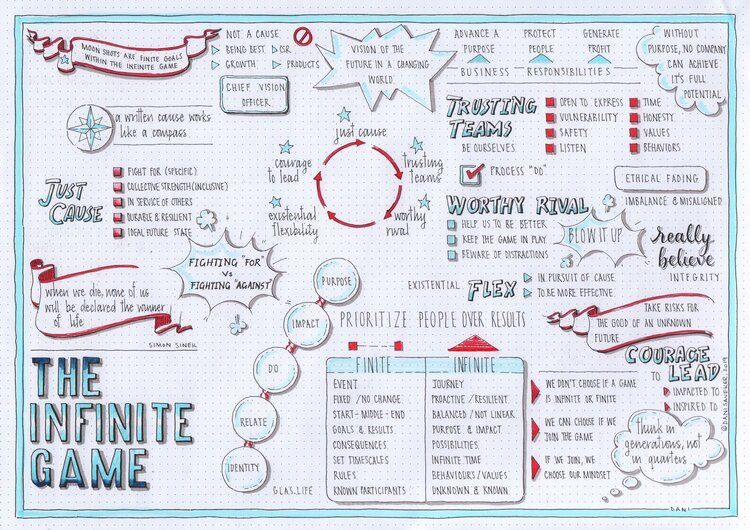The concept of the infinite game was first introduced by Simon Sinek in his book "The Infinite Game." In this book, Sinek discusses the differences between finite and infinite games and how they apply to business and leadership.
Finite games, according to Sinek, are those that have known players, fixed rules, a clear beginning and end, and an objective to win. Examples of finite games include sports, board games, and elections. These games have a clear objective and a defined outcome, and the goal is to win by beating the other players or teams.
On the other hand, infinite games are those that have known AND unknown players, the rules can change, no clear beginning or end, and the objective is to perpetuate the game. Examples of infinite games include business, politics, and warfare. In these games, the objective is not to win by beating the other players, but to keep the game going by ensuring that it continues to evolve and adapt. You drop out of the game if you run out resources, or the will to keep playing.
One of the key principles of the infinite game is that it is never truly won or lost. Instead, the focus is on continuing to play and adapt in order to stay relevant and competitive. This means that the players in an infinite game must constantly strive to improve and innovate in order to stay ahead of their competitors and ensure the game continues.
According to Sinek, the key to succeeding in an infinite game is to have a clear purpose or "why." This why, he argues, should be something larger than just making a profit or achieving a specific outcome, or hitting an arbitrary goal that not neccesarily everyone has agreed to that specific metric. Instead, it should be something that inspires and motivates the players to keep going, even in the face of challenges and setbacks.
For example, in business, a company's why might be to make the world a better place through the products and services they offer. This why would inspire the company's employees to keep pushing forward, even when faced with difficult challenges or competition. It would also help to differentiate the company from its competitors, as customers are more likely to be drawn to companies that have a clear purpose and mission. This links to having a just cause that Simon also explains.
Another important principle of the infinite game is that it is never about beating the other players. Instead, the focus is on collaborating and finding ways to work together to keep the game going. This means that players must be willing to take risks and try new things in order to stay ahead of the game. It also means that they must be willing to let go of their ego and prioritise the overall success of the game over their own personal gain.
In order to succeed in an infinite game, leaders must also be willing to embrace change and adapt to new circumstances. This means that they must be flexible and open to new ideas, even if those ideas challenge their existing beliefs or ways of doing things. It also means that they must be willing to let go of their old strategies and ways of thinking in order to stay relevant and competitive.
Overall, the concept of the infinite game offers a valuable perspective on leadership and business. By focusing on a clear purpose and a collaborative approach, leaders can create organisations that are resilient and adaptable, and that are able to thrive in an ever-changing world.
❤️ Enjoyed this article?
Forward to a friend and let them know where they can subscribe (hint: it's here).





